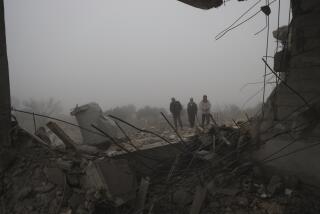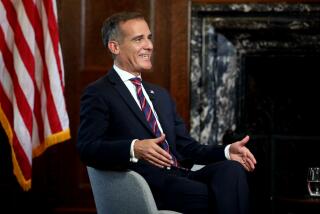Egyptian Diplomat in Iraq Missing
- Share via
BAGHDAD — Egypt’s top diplomat in Iraq, who was to become the first ambassador from an Arab nation here, was missing Sunday after apparently being abducted near his home, authorities said.
Ihab Sherif, head of Egypt’s diplomatic mission in Baghdad, disappeared after going out late Saturday. His vehicle was found next to a newsstand near his home. Witnesses reportedly said he had been taken by gunmen who had beaten him and called him an “American spy.”
Kidnappings have become commonplace in Iraq the last two years, but no one of Sherif’s rank had been seized.
In Cairo, the Egyptian government said it had sought help from Iraqi authorities to determine whether Sherif had been abducted. Authorities in Baghdad said the diplomat’s office was not aware that he was missing until Sunday morning, when a driver went to pick him up at his home.
“The Egyptian Ministry of Foreign Affairs hopes for a speedy clarification of the situation and the safeguarding of the security of the Egyptian diplomat who is charged with strengthening relations between the two brotherly peoples of Egypt and Iraq,” the ministry said in a statement.
Egypt recently announced that it would upgrade its mission in Baghdad to an embassy, becoming the first Arab nation to be represented here by an ambassador since the ouster of President Saddam Hussein.
Many had seen the naming of an ambassador as an expression of confidence among Arabs in the new government, but Sherif’s disappearance could deter other nations in the region from following Egypt’s lead.
The Iraqi government of Prime Minister Ibrahim Jafari is struggling to deal with an insurgency led by Sunni Arabs and foreign Islamic extremists that has led to more than 1,700 deaths since the government was formed in late April. Insurgent attacks continued Sunday, as a car bomb killed three Iraqi police officers at a checkpoint north of Baghdad.
But U.S. forces also have been blamed for the deaths of numerous civilians. In an unusually blunt criticism of the U.S. military Sunday, Jafari’s spokesman called on American troops to reduce the killing of unarmed civilians on Iraqi streets and during house-to-house searches.
Laith Kubba deplored the recent shooting deaths of two Iraqi journalists and a cousin of Iraq’s ambassador to the United Nations and said that Jafari would raise the matter at the “highest levels” of the U.S. government. “I can tell you, Iraqis are not happy about it,” Kubba said.
In discussing the civilian deaths, U.S. forces maintain that they cannot take unnecessary risks and that they fire at suspicious vehicles to prevent car bomb attacks on military convoys and checkpoints.
In a June 24 case cited by Kubba, Yasser Salihee, 30, a special correspondent for Knight-Ridder newspapers, was apparently shot by a U.S. sniper when he approached a checkpoint in his car. Salihee, a physician, was driving alone on his day off.
On Tuesday, U.S. forces shot Ahmed Wael Bakri, also 30, a television news producer for the independent satellite channel Al Sharqiya, when he stopped near a military convoy.
“America claims a lot of humanitarian rights and positive notions, but we see the opposite in how they treat people,” said the victim’s father, Ahmed Wael Bakri. “True, they have freed us from a dictatorial regime, but that does not give them the right to kill us, does it?”
Samir Sumaidaie, the Iraqi ambassador to the United Nations, charged Friday that U.S. Marines had killed his cousin, Mohammed Sumaidaie, 21, in “cold blood” during a search of the family’s house in the western province of Al Anbar on June 25. The university student was cooperating with the search and had led soldiers to a bedroom to show them an unloaded rifle moments before he was killed, the ambassador said.
The United States is investigating all three killings.
In a previously unannounced visit, U.S. Atty. Gen. Alberto R. Gonzales arrived in Baghdad for the day Sunday to mark the Fourth of July holiday weekend. Gonzales has been mentioned as a possible nominee to replace Sandra Day O’Connor on the Supreme Court.
“I suspect there’s some of you that are here that sometimes feel lonely and you sometimes wonder whether you are alone,” Gonzales told American soldiers at the U.S. Embassy. “And I’m here to tell you that you are not alone, that the American people are very much with you.”
As President Bush’s legal counsel during his first term, Gonzales wrote a memo declaring that, in regard to detainees the U.S. seized in the war in Afghanistan, the president could waive anti-torture laws that protect prisoners of war. Some critics say the memo contributed to the abuse of prisoners by American soldiers at Abu Ghraib, a contention Gonzales rejects.
Current and former military officers also fear that American mistreatment of prisoners could result in the mistreatment of captured American soldiers.
In the case of the missing Egyptian diplomat, much remains a mystery. Sherif, 51, had been in Baghdad for less than a month when he disappeared.
Traveling by car in the capital can be so dangerous that most high-profile people do so with at least one other vehicle, the second carrying armed guards. For reasons that remain unexplained, the diplomat apparently went out Saturday without a chase vehicle. According to some accounts, he was driving alone, also rare for a foreign dignitary. He was in a white jeep with diplomatic license plates.
It is not unusual for kidnappers to stalk a potential victim for days or weeks, waiting for an opportunity to grab him.
Sherif had further reason to take precautions: Egypt’s third-ranking diplomat in Iraq, Mohammed Mamdouh Helmi Qutb, was kidnapped a year ago and held for several days. According to three witnesses interviewed by Associated Press at the scene of Saturday’s reported abduction, as many as eight armed men seized Sherif after he stopped near the newsstand not far from his home.
The men beat him, hit him on the head with a pistol and called him a spy, said the witnesses, who were not identified.
The witnesses said they afterward stopped a U.S. military convoy and reported the incident. The soldiers searched the jeep and moved on, they said.
*
Times staff writer Megan K. Stack in Cairo and special correspondents Asmaa Waguih and Zainab Hussein in Baghdad contributed to this report.
More to Read
Sign up for Essential California
The most important California stories and recommendations in your inbox every morning.
You may occasionally receive promotional content from the Los Angeles Times.













